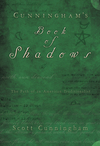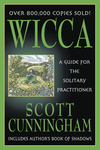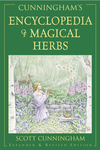Scott Cunningham Remembered: Public and Private

The landlord of the house that I shared in Encinitas, north of San Diego, had the roof of the house resurfaced. A month later, during torrential rains, the terrible job that was done turned the house into a waterfall. The people who lived there decided we had to move.
I knew the owners of a small occult store, Ye Olde Enchantment Shoppe, and happened to go there a few days later. On the store’s bulletin board there was a 3 x 5 card from a person offering a room for rent. I asked the owner, Judith, what she knew about him. "Oh, he's a nice young man and a writer. I think you'll like him." I called, saw the second bedroom that he was subletting, and ended up spending the next six years as the roommate of Scott Cunningham.
When people find out that Scott and I were friends, the most common question I get is "What was he like?" That's difficult to answer because different people experienced Scott in different ways. So I asked some people who knew him what Scott meant to them personally and to the community.
The first person who quickly offered a response to my request was Carl Llewellyn Weschcke, Chairman of Llewellyn. He wrote:
"Scott was a good author who became a good friend. More than merely a good friend, he was one of those friends I truly loved and valued.
We exchanged a lot of mail and we talked a lot when he visited, and I was honored that he chose to spend a last Christmas/Yule with us as his "goodbye" to the many people at Llewellyn who also loved and respected him.
Scott was the most understated, charismatic person I've ever known. Everyone gravitated to him—and I am speaking here of the large Wiccan and Pagan Community who met him and delighted in his talks and conversation. Yet, unlike many others who are described as charismatic, that is not the first word most people would use to describe Scott Cunningham. Those who knew him in person and those who knew him through his books would all, I believe, speak of his sincere honesty and devotion to the Craft, and to the craft of writing.
Scott was always concerned that someone could mistake an ingredient in his recipes and be hurt, or that someone could misunderstand any of the rituals or statement in his books. As a result, he would write draft after draft of his books before he was satisfied they could "harm none." At the same time, Scott never saw himself as an "elder" or other authority, and he was very much concerned that Wicca not become any kind of official religion with a ruling hierarchy and an approved theology.
Scott wrote for individuals who would study and grow through practice and experience rather than degrees and badges. He believed in experimentation and self-discovery. He would study and practice, ask opinions, but still it was his own counsel that guided his interpretations of magic and ritual.
The world knows him as a prolific author, but as his publisher impatiently awaiting the next manuscript I know of the careful and factual writer who sought accuracy and perfection in his style. Just as much as Gerald Gardner, Ray Buckland, Lady Sheba, and those other great ones, Scott Cunningham is responsible for the best in modern Wicca and Paganism.
Wherever you are Scott, your friends and readers still remember you, honor you, and love you."
I think Mr. Weschcke put his finger on an aspect of Scott that was quite unique. He wasn't flamboyant or trying to attract attention, but he just naturally drew people to him. When I give workshops I stand, move around, gesture, and use my body language to amplify what I'm saying. When Scott gave a workshop he would sit in one place and amaze me (and the audience) with the depth of information at his fingertips and his ease at expressing it so it would be understandable.
Scott's books never talked down to the reader. They were honest and direct, presenting Scott just as he was. As a result, some people have mistaken Scott's simplicity and clean writing for "fluffiness." I think this is an absolute mistake. Being simple can also mean being clear. That's exactly what Scott was. For proof of his depth, just look at his Encyclopedia of Magical Herbs and Encyclopedia of Crystal, Gem & Metal Magic, both of which are standard resources in the field.
The next person who was kind enough to respond was Raven Grimassi, author of books including Spirit of the Witch and Hereditary Witchcraft. Like Scott and myself, Raven lived in San Diego. Scott and I first met Raven by taking a workshop he was giving. Raven writes:
"I first met Scott Cunningham in 1979 when he attended a series of classes I presented on Wicca. The class took place in San Diego at a store called Ye Olde Enchantment Shoppe. Scott sat in the back of the room, and caught my attention because he kept shrugging his shoulders and taking furious notes. After class, Scott would often come up and ask questions or make comments. Before long we became friends.
Scott was a very funny man who loved to insert puns at every opportunity. He wrote for a magazine I created, called The Shadow's Edge. Scott was a columnist for the magazine with two features sections: "The Green Man," and "Coven Crack-Ups." The former contained his writings on herbs and plant lore. The latter was a collection of jokes and musings that occurred in circle after the completion of the ritual and the administering of much celebratory wine.
Scott was initiated into my Aridian Tradition of Witchcraft in 1980 as a first degree, but left the system almost two years later in favor of a self-styled form of Wicca. Scott became a very popular and successful author writing about his personal vision of Wicca. His books opened the way for many people that felt disenfranchised from organized religion, and who were seeking a different path.
In my opinion, Scott's books brought Wicca to a crossroads where tradition and personal vision divided into separate roads. His writings changed the way Wicca was viewed in the days of Gerald Gardner and Doreen Valiente, and were responsible for a new definition and practice of Wicca. This bold move has placed his name forever in the history of key people associated with the movement."
Indeed, it was during the late 1970s and early 1980s that Wicca reached a tipping point. Its growing popularity had thousands of people wanting to become members. At the time, though, the way to become a member was limited to initiation within a coven structure. If you didn't have access to a coven, you couldn't really be Wiccan. This troubled Scott. Why did you need to be initiated into Wicca just to worship the Goddess? If you had to be initiated to be a Witch, who initiated the first Witch? His personal experiences with covens and his personal revelations resulted in one of his most popular books, Wicca: A Guide for the Solitary Practitioner. While other books on this subject have been published, this was the first one to catch the public's attention and, as Raven pointed out, literally revolutionized the practice of Wicca. Unlike thirty years ago, today "Solitary Wicca" is the most practiced style of Wicca.
And yes, Scott was very funny and a great punster. I don't know if it's a good thing, but Scott and I would frequently have punning contests as well as what at the time were called "chop out" contests, where we would jibe each other with insults. We could get away with this because we both respected each other and knew that they were just jokes and did not have real emotion behind them. One day, Scott said to me, "You always want to be the center of attention!"
Later that night, at a party, Scott had a crowd around him. I went up and said, "Oh, so I'm the center of attention, huh?" We both laughed for some time. Occasionally we would meet someone who would obviously take any sort of remark personally and we wouldn't play with him or her in this way.
Another person from that period in San Diego was Marilee Bigelow. Scott and I, as well as some other people, used to hang around her house and kitchen table, having discussions late into the night. Her Hallows celebrations were legendary. She now lives in the San Francisco Bay area and was recently voted the best Tarot reader in the city. She writes:
"In the wintertime, Scott and I would often pile into my car and head off up into the mountains of East San Diego County. We would wander for hours in this wilderness area, enjoying the sights, sound, and smells of these fabulous woodlands. One of my favorite memories of Scott was spending all day gathering plants, berries, and herbs in this forest.
When we were satisfied we had collected a sufficient supply for our projects, we hauled our precious cargo home and laid out our treasures for inspection. Among the many items we wildcrafted were full, voluptuous, evergreens, a variety of fragrant leaves, and many types of plump berries including mistletoe.
Then we spent the rest of the entire evening fashioning picturesque wreaths, making ornamental boughs, and creating unique Yule Logs for all our friends and family. We hung mistletoe, and proceeded to get so carried away that we decorated the entire house. When we were finished (which was sometime in the wee hours of the morning) it looked and smelled like the woods we had so recently left. It was truly an exquisite experience!
Scott gave the Pagan community a huge amount of information that was well written and easy to understand. It was important to him to be as accurate as possible, and he would only use a source if he could validate it in at least three places. I assisted him in this task and he often utilized my library for his research.
His influence and contribution to the world was, and is, tremendous, especially when you consider how many lives his books have personally touched. Even though he was an incredibly prolific writer, he never broke his Oaths of Secrecy or betrayed those he had relationships with in the Craft. Scott had a high ethical and moral standard in that regard, a quality any young Witch would do well to emulate. That was my friend, Scott Cunningham."
I also know about Scott's dedication to accuracy. Scott never published anything without checking his information for accuracy or trying things himself. When he was writing about drying herbs, I had to dodge branches hanging from the rafters. When he was writing about corn dollies, he drove to Tijuana, Mexico to obtain some straw. He soaked it in the bathtub so I couldn't take a shower!
Even though Scott was becoming famous, being a beginning author does not always pay the bills. I was working at a variety of jobs, ranging from magazine sales over the phone and working in a store that sold sleight-of-hand magician's supplies, to being a Tarot reader, a bank courier, and a workshop leader. In short, neither of us was rich and it wasn't uncommon for either of us to run short of money. We didn't loan money to each other, but we would take each other out for food and entertainment.
However, the main way we would support each other was through our personal libraries. We each had nice libraries, and if one of us was broke, we would regretfully figure out which books we could sell. Inevitably, before taking them to a bookstore, we'd buy them off of each other. As a result, I'd buy books from Scott and he'd buy books from me. Sometimes, the same book would change hands between us several times.
Besides having my highest respect, Scott was a great friend. He passed to the Summerland on March 28, 1993. Sometimes, I think that was his last and greatest joke on me. March 28 is my birthday. Now, I can't have a birthday without thinking of him. Good joke, Scott. But you needn't have worried. Carl, Raven, Marilee, and hundreds of thousands of your admirers think of you every day.

About Donald Michael Kraig
Related Products



is subject to certain Terms and Conditions